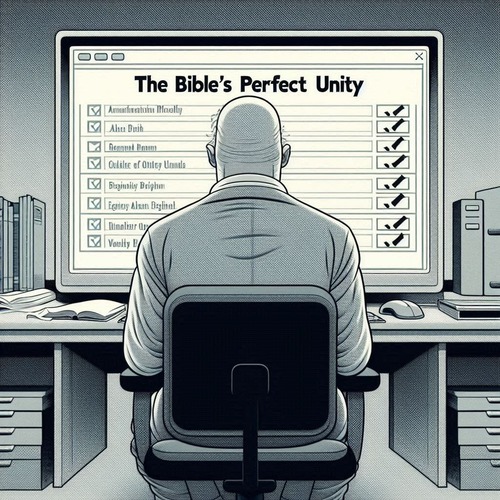Internal Consistency: The Bible’s Perfect Unity from Genesis to Revelation
The Bible’s Perfect Unity The Bible stands as history’s most remarkable book—not merely for its cultural impact or literary influence, but for its astounding internal consistency. Despite being written across 1,500 years by dozens of authors from diverse backgrounds, it presents one coherent narrative that unfolds with divine precision. Let’s explore this magnificent unity from its opening pages to its triumphant conclusion.
The Foundation: Promises in Genesis
- The protoevangelium (Genesis 3:15)
- The Abrahamic Covenant
- The promised seed and blessing to all nations
- Themes of sovereignty and divine election
When sin entered God’s perfect creation, something remarkable happened. Within the very pronouncement of judgment came the first gleam of gospel hope. Genesis 3:15 introduces us to the “protoevangelium”—the first announcement of good news, promising the seed of woman would crush the serpent’s head. This foundational promise sets the stage for everything that follows.
The divine narrative takes clearer shape through God’s covenant with Abraham. Here we find promises that would echo through millennia: a chosen people, a blessed nation, and through them, blessing to all peoples of earth. These weren’t mere cultural promises, but the very scaffolding of redemption history.
The Development of God’s Covenant Plan
- Noah and God’s faithfulness
- Abraham and unconditional election
- Moses and the law as guardian
- David and the eternal kingdom
Like a master composer developing his theme, Scripture shows God’s covenant promises growing in clarity and depth. Through Noah, we see divine faithfulness despite human failure. In Abraham’s story, we witness promises that transcend human understanding or ability. The Mosaic Covenant introduced in Exodus reveals God’s law and holiness, underscoring humanity’s need for a Saviour. The laws of Moses couldn’t ultimately save (Romans 3:20), but they clearly revealed the weight of sin and the holiness required to approach God. The Mosaic covenant reveals how God’s law serves His redemptive purpose, while David’s throne points toward an eternal kingdom.
The Prophetic Voice
- Isaiah’s Suffering Servant
- Daniel’s Son of Man
- Jeremiah’s New Covenant
- The consistent theme of divine initiative
The prophets add rich harmony to this divine symphony. Isaiah paints vivid portraits of a suffering servant who would bear His people’s sins. Daniel speaks of a Son of Man receiving an everlasting kingdom. Jeremiah proclaims a new covenant written not on stone but on human hearts. Each voice adds texture and detail to the original promise, never contradicting but always enriching.
The Perfect Fulfillment
- Jesus as the second Adam
- The true Israel
- The ultimate Prophet, Priest, and King
- Perfect covenant keeper
All these streams flow into one ocean: Jesus Christ. He stands as the perfect fulfillment of every promise, prophecy, and pattern. As the second Adam, He succeeds where the first Adam failed. As true Israel, He keeps the covenant perfectly. As Prophet, Priest, and King, He fulfils every office foreshadowed in the Old Testament.
The New Testament: Promise Fulfilled and Explained
- The gospels: Fulfillment of Old Testament promises
- The epistles: Theological reflection and practical outworking
- Revelation: The consummation of God’s redemptive plan
The four Gospels don’t merely tell Jesus’ story—they deliberately showcase how every Old Testament promise finds its “yes” in Him. Matthew’s constant refrain, “this happened to fulfil,” John’s strategic signs, and Luke’s careful historical narrative all demonstrate how Jesus embodies every prophetic hope. From His virgin birth to His sacrificial death, from His Davidic lineage to His supernatural resurrection, the Gospels paint Christ as the culmination of all God purposed since creation.
The Epistles then unpack this magnificent fulfillment, explaining its profound implications for God’s people. Through Spirit-inspired theological reflection, they reveal how Christ’s work transforms everything: our standing before God, our identity as His people, our mission in the world. Revelation completes the biblical narrative by showing the ultimate consummation of all God’s promises. Here, in apocalyptic splendor, we see the final defeat of the serpent, the perfection of God’s covenant people, and the establishment of the new creation—everything promised in Genesis now brought to glorious completion.
The Church: God’s Covenant Community
- Grafted into true Israel
- Heirs of Abrahamic promise
- The gathering of elect from all nations
- Continuation of God’s sovereign plan
This redemptive story continues in God’s people today. The church represents not a break from God’s previous work but its organic development. Through Christ, those from every nation become children of Abraham, heirs according to promise. The gathering of God’s people from all cultures fulfils the ancient promise that Abraham would bless all nations.
Conclusion: One Story, One Purpose
The Bible’s perfect unity isn’t imposed from outside but grows organically from within. From Eden’s lost paradise to the Cross’s victory, from ancient promise to present fulfillment, Scripture tells one story. It reveals a God who works all things according to his eternal purpose, bringing everything to its appointed goal.
The Bible’s Perfect Unity—Related FAQs
- How do we know the Bible is truly one unified story and not just a collection of religious texts? The Bible’s unity is evidenced through its consistent theological themes, prophecy fulfilments, and interconnected promises, despite being written across different centuries and cultures. The same divine characteristics, standards of holiness, and message of redemption appear from Genesis to Revelation. Most compellingly, hundreds of specific prophecies find their fulfillment in precise detail, demonstrating divine authorship orchestrating every word.
- Why do some passages seem to contradict each other if the Bible is unified? Apparent contradictions often result from our limited understanding of historical context, literary genres, or the progressive nature of God’s revelation. What might seem to be contradictions are actually complementary truths revealing different aspects of God’s character and plan. God’s unchanging nature ensures that newer revelations always build upon, rather than contradict, previous ones.
How does God’s sovereignty relate to human responsibility in the Bible’s narrative? Scripture consistently presents both God’s absolute sovereignty over all events and genuine human responsibility without contradiction. From Joseph’s story to Christ’s crucifixion, we see that God ordains all things while humans make real choices for which they’re accountable. This mystery doesn’t diminish either truth but showcases God’s perfect wisdom in accomplishing His purposes through human actions.
- What role do types and symbols play in connecting the Old and New Testaments? Biblical types and symbols serve as divine teaching tools, showing how earlier persons, institutions, and events foreshadow greater realities fulfilled in Christ. The tabernacle, sacrificial system, and figures like Moses and David all point forward to Christ’s person and work. These patterns demonstrate God’s intentional design in revealing His redemptive plan progressively.
How does Revelation complete themes started in Genesis? Revelation intentionally mirrors Genesis, bringing God’s story full circle: the tree of life reappears, access to God is restored, and the curse is removed. The serpent’s final defeat fulfils Genesis 3:15’s promise, while the bride of Christ represents the ultimate fruition of God’s covenant people. Every problem introduced in Genesis finds its solution in Revelation.
- What makes the Bible’s literary unity remarkable? Despite its diverse human authors, the Bible maintains consistent metaphors, themes, and portrayals of God’s character across all its books. Major themes like covenant, kingdom, and redemption develop naturally without contradiction. The Bible’s various genres work together seamlessly to communicate God’s truth through different literary approaches.
How should understanding biblical unity affect our daily Bible reading? A sense of the Bible’s unity should lead us to interpret each passage in light of the whole counsel of Scripture, rather than in isolation. We should look for Christ at the centre of every text, recognizing how each portion contributes to the grand narrative of redemption. This approach deepens our worship as we see God’s wisdom in weaving together every detail of His Word.
The Bible’s Perfect Unity—Our Related Posts
Editor's Pick

GPS Without Eyes: How Ants Silently Shout Intelligent Design
Picture a leafcutter ant navigating the rainforest floor in pitch darkness, carrying a leaf fragment 50 times its body weight. [...]

Born Broken: Why Must We Affirm Original Sin?
Imagine a world where we’re born neutral—free to choose good, and without a bias toward evil. Sounds appealing… until we [...]

Does God Truly Care About My Everyday Choices?
OWe believe God created the universe. We believe He orchestrated the exodus from Egypt and raised Jesus from the dead. [...]
SUPPORT US:
Feel the Holy Spirit's gentle nudge to partner with us?
Donate Online:
Account Name: TRUTHS TO DIE FOR FOUNDATION
Account Number: 10243565459
Bank IFSC: IDFB0043391
Bank Name: IDFC FIRST BANK






